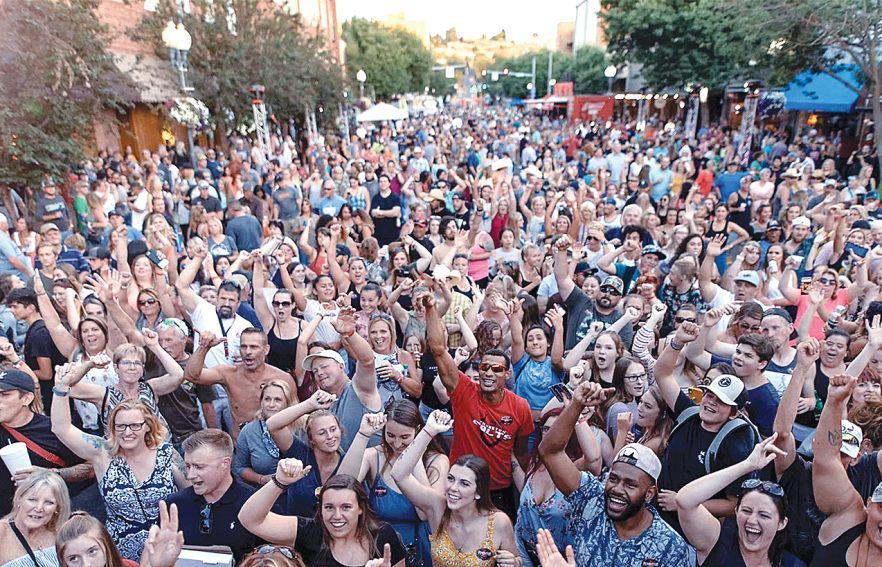Four EOCI inmates on hunger strike against solitary confinement conditions
Published 8:00 am Thursday, August 20, 2020

- Eastern Oregon Correctional Institution in August 2020. Minimum prison sentences are mandatory for some crimes under an Oregon law passed by voters in 1994 known as Measure 11.
PENDLETON — Prison officials confirmed Tuesday, Aug. 18, that at least four inmates in solitary confinement at Eastern Oregon Correctional Institution in Pendleton began a hunger strike to protest conditions and treatment within the unit on Aug. 17.
“They’re literally just asking to be treated like human beings,” said Rose Harriot, whose partner is participating in the hunger strike inside the prison. “They’re scared for their lives, and the facility needs to take on the responsibility to keep our loved ones safe.”
EOCI spokesman and Supervising Executive Assistant Ron Miles confirmed the strike was occurring and acknowledged its demands in an Aug. 18 email.
“We will continue to monitor the (adults in custody) involved to ensure they are not endangering themselves physically,” he stated. “It is an (adult in custody’s) prerogative not to eat the meals we provide. DOC is responsible for their health and well-being, and will intervene only when that is threatened.”
According to a news release written by Harriot, the group has four specific demands:
• Immediate transfer of Steven Corbett to a hospital that can provide him with the lifesaving medical care he needs.
• Allow the purchase of basic hygiene and cleaning supplies upon arrival to solitary.
• Immediate release of everyone who has been placed in solitary confinement for a nonviolent rule violation and a permanent end to the use of solitary confinement for all nonviolent rule violations.
• One call a week for all people in solitary confinement, and an immediate end to the “green card” system that allows correctional officers to arbitrarily deny communication to loved ones on the outside.
The release identified Corbett as having Crohn’s disease, an inflammatory bowel disease that can sometimes cause life-threatening complications, and as having recently suffered from seizures and other health complications while in solitary confinement.
“Other men in solitary have been watching him get hurt and believe he is dying, while the nurses assert that ‘he is faking it,’” the release stated. “The men that are watching him die refuse to stand by and do nothing so they initiated this hunger strike.”
Miles refuted these claims as “not true” because Corbett is held in a cell without windows facing any other cells, and the “physical structure” of the unit makes it “impossible” for the other inmates to see him.
Harriot contested this explanation, stating Corbett could have been seen while leaving his cell to receive medical treatment, which Miles stated couldn’t be disclosed due to medical privacy laws.
“He is assessed every day by medical staff, and the Medical Services Manager is ensuring he receives appropriate treatment,” Miles stated in an email. “DOC is prohibited by law from disclosing any information about patient health care status, decisions, and treatment.”
The group is also calling for an end to the standard procedure of inmates being provided with only a bar of soap, a toothbrush, and baking soda when placed in solitary confinement and being prohibited from purchasing additional personal hygiene supplies unless they’re held there for more than 30 days.
“This is dehumanizing and given the outbreak of COVID-19 at EOCI is life threatening,” the news release stated.
As of Wednesday, Aug. 19, EOCI has reported 193 confirmed cases of the virus among its roughly 1,700 inmates. At least 18 staff members have also tested positive.
The group also wants the end of nonviolent violations by inmates being punished with solitary confinement, which the news release characterized as “torture” for the detrimental impacts the punishment has been documented as having on those subjected to it.
Miles stated inmates are “periodically” subjected to solitary confinement for investigations into non-violent violations or a “rule violation,” while also claiming the prison provides each inmate in the unit with “as much out of cell time as possible.”
As for phone calls between inmates in the unit and their loved ones, Miles stated each inmate is given pencil and paper but “can earn an incentive phone call if they follow the rules, keep their area clean, and participate in some type of programming.”
The “green card system” is used to track inmates placed in solitary confinement, Miles stated, and phone privileges are determined by the unit’s lieutenant rather than individual correctional officers.
Harriot said the stress and fear brought on by the inability of her and others to consistently communicate with their loved ones inside EOCI and its solitary confinement unit are only compounded by concerns about the prison still having one of the single largest COVID-19 outbreaks in Oregon.
“The people in solitary are expressing more humanity than the people who are running the institution. They’re putting their lives on the line to make sure this man gets medical care and they get treated like human beings,” she said. “I hope people realize how serious of an action this is to take, and that those of us who were already scared outside are even more scared right now.”









